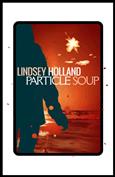reviewed by Ian Chung
Scientific in its choice of vocabulary, Holland's debut collection is at heart deeply human
To look at the titles given to Lindsey Holland’s debut collection (Particle Soup) and its sections (In Biopoeisis and The Mandelbrot Set), one might be forgiven for expecting the poems to be of a clinical bent. Instead, what the reader encounters in poem after poem is an interest in excavating the strength and frailty of humanity, albeit through a use of precise imagery that recalls David Morley’s formulation of poetry in the ‘Materials and Methods’ section of his collection Scientific Papers: ‘The concept […] is that each piece of writing is a scientific paper of itself, a series of findings. The practices of writing science and poetry are […] a single discussion of perception carried out with the same eye and ear, and in the same laboratory of language.’
If one learns anything it is that all the encountered disappointments can be survived
The first section of Holland’s collection is named for biopoiesis, the theory regarding the origin of life on Earth that believes living organisms developed from non-living matter. Etymologically, ‘poiesis’ derives from the Ancient Greek verb ‘to make’, so this section might be thought of as laying down raw material in the form of poetry for the purposes of producing even more poetry. An appropriately recursive idea, given that the rest of the collection is in turn named after the famous Mandelbrot fractal. The collection’s first poem then opens with a perfectly calibrated image that unites the opposition of life and non-life: ‘Meet the most castle of castles. A marrowbone / frame, all knuckles, cantilever sockets, / a buried skull.’ The stone of the castle is transmuted into a skeletal body. Yet this is not quite life, so the poem goes on to speak of ‘the Count’ who ‘breathes through the walls’, and since the end goal of life is reproduction, there is mention of ‘a smear of DNA’ and the ominous-sounding sentence nestled at the heart of the poem, ‘They inherit him here.’
Holland’s gift for the striking image shines through even in the shortest of poems. The fourth in the In Biopoeisis sequence is a mere three lines long: ‘Between runways / I am a mouth / collapsed on itself.’ Nonetheless, it succeeds in providing a singular visual illustration of the making/unmaking binary. The first line focalises our attention on the ‘I’ of the poem, only for the ‘I’ to undo this privileging by reducing and equating itself to only ‘a mouth’, while the final line introduces an element of reflexivity, which re-individuates the ‘I’ once more. There is also an elegant balance to how the first and last poems of the In Biopoeisis sequence construct their final images from the same object, but paired to contrary motions: ‘I pin myself here, pluck a hair and let it drop’ versus ‘I pull my hair into a new brown band and run’.
The idea of running then carries over into the next sequence, The Mandelbrot Set. In ‘First, Explore the Cracks’, Holland writes:
It seemed the time to shake ourselves, run from every mapped footstep toward crueller, cleaner things.
In keeping with the scientific aspect of Holland’s collection, this desire to progress ‘toward / crueller, cleaner things’ actually calls to mind something like a scalpel, glittering and sterile. However, the rest of the poem suggests that what is going on has more to do with the evolution of a relationship, cf. the poem’s opening, ‘We used to do this’. The poem’s title thus reads like a cautionary instruction.
Furthermore, the divisions of The Mandelbrot Set actually appear to track the life cycle of a relationship: ‘We Wake into Pattern’, ‘The Engaging’, ‘Chronomentrophobia’ (the fear of clocks, which measure out our time together and apart), ‘The Warring’. Read in this light, a poem like ‘Phobia’ from ‘The Engaging’ perhaps combines both humour and foreshadowing: ‘you told me / you wanted to marry / … / to get the bloody thing over with’. Or consider the punning of a title like ‘The Mourning Before’, as the poet declines to ‘ask what happened’ on the morning after because ‘we’ve been here before’. Like a fractal, betrayal can undergo iterations too.
Yet if one learns anything by the end of Particle Soup, it is that all the encountered disappointments can be survived. ‘There is no right / time for the wrecking ball’ (‘It Comes to Blood’):
But realistically you need to map new glass routes’ (‘Lie Back, Keep Moving’)
Even though there is a painful truth to what a poem title like ‘The Arrow Will Find the Heel’ proclaims, maybe what is needed is the paradoxical approach advocated by the title of the last poem in the collection, ‘Lie Back, Keep Moving’. With Particle Soup, Holland has sculpted language into a series of trenchant memorials, generating an effect that Luke Kennard describes as ‘a sense of loss, but of essential gain’.










